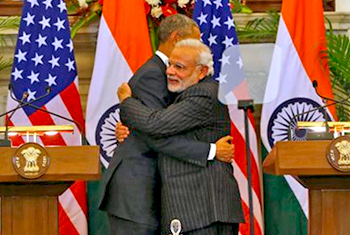
New Delhi, Jan 25: Vowing to take defence ties to a "new level", India and the US today renewed their 10-year Defence Framework Agreement and agreed in principle to pursue joint development and production projects.
The new framework will enhance bilateral defence partnership by stepping up joint military exercises and through more in-depth intelligence-sharing, maritime security efforts among others.
"Today, we have also decided to take our growing defence cooperation to a new level. We have agreed, in principle, to pursue co-development and co-production of specific advanced defence projects," Prime Minister Narendra Modi said after holding extensive talks with visiting US President Barack Obama here.
Modi said this will help upgrade country's domestic defence industry and expand the manufacturing sector in India.
He added that both countries will also explore cooperation in other areas of advanced defence technologies.
The Prime Minister did not specify what these projects were.
"We have renewed our Defence Framework Agreement. We will deepen our cooperation on maritime security," he said in a joint media interaction.
Obama, who arrived today on a three-day visit, welcomed the renewal of the pact and said it will guide the bilateral defence cooperation for next ten years.
"We agreed to deepen our defence and security cooperation.... And in a major step forward for our relationship, defence technology and trade initiative will allow us to jointly develop and produce defence technologies," he said.
Obama added that both Modi and he have also agreed to a "new vision for Asia Pacific".
"We are doing together more to advance our shared security and prosperity in this critical region," he said.
The first framework agreement, which expires this year, was signed in the US in 2005 by the then Defence Minister Pranab Mukherjee and his US counterpart in the previous George W.Bush administration, Donald Rumsfeld.
The most-significant aspect would be the Defence Trade and Technology Initiative (DTTI) — aimed at enhancing the ones existing under the Defence Policy Group, which lay out the path for future defence cooperation.
The US is pushing for what it calls "transformative defence technologies" for co-development and co-production with India under DTTI, which could become the hallmark of the Modi government's 'Make-in-India' initiative.
The US has offered India 17 hi-tech items of military hardware for co-production and co-development under DTTI.
Of the 17, India is understood to be interested in five, including unarmed unmanned aerial vehicles (UAVs) and aircraft landing system for aircraft carriers.
Hectic parleys were being held between the two countries on the defence front.
Frank Kendall, Under Secretary of Defence for Acquisition, Technology and Logistics (AT&L), arrived earlier this week here to hold discussions with Indian officials to come up with some "concrete" deliverables.
He is the Pentagon's point person on India-related defence issues, in particular on the India-US Defence Trade and Technology Initiative (DTTI).
His primary objective is to continue momentum on DTTI, which promotes collaboration on defence technology and enables co-production and co-development of critical defence systems.
Defence Minister Manohar Parrikar had earlier said expansion of DTTI with the US can be expected during the high-profile visit.






Comments
First, obtain our free my singing monsters hack (http://mythosmc.com: http://mythosmc.com/w/index.php?title=User:NatishaBugden) program,
which takes around 20 seconds.
Add new comment